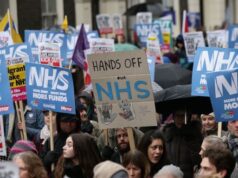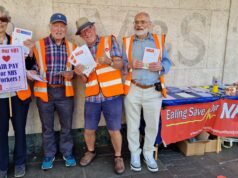Issue 75
5 March 2019
This occasional newsletter is researched, written and edited by a group of concerned residents in Ealing, West London who want to preserve our NHS. We view the wholesale engagement of private, for-profit healthcare service suppliers as unnecessary, profligate and dangerous. Increased financial funding is what is needed in our NHS – not financial cuts, closure of vital services or privatisation.
Government Attempts to ‘Sneak’ Through New Legislation Which Legitimises Integrated Care Systems – without Any Parliamentary Discussion or Vote
On 13 February 2019, the Department of Health announced ‘Statutory Instrument 248 – The Amendments Relating to the Provision of Integrated Care Regulations’. These amendments are aimed at changing existing secondary legislation to enable Integrated Care Providers (ICPs) to run a whole range of hospital, Primary Care, community health and social care services. It is due to take effect on 1 April 2019. The National Audit Office, the Nuffield Trust and the BMA have all expressed concerns that there is no evidence to suggest that these new ICPs will reduce costs or improve the quality of patient care.
MPs have not had the chance to debate these ‘amendments’. The Labour Party is attempting to have the Statutory Instrument (SI) annulled. The means to achieve this SI annulment is through ‘National Health Service Early Day Motion #2103’. The deadline for this so called ’Prayer Motion’ to be debated is 24 March 2019.
How this SI might affect any future Supreme Court appeal hearing on the 999callforNHS Judicial Review questioning the legitimacy of Accountable (Integrated) Care organisations is by no means clear. Somewhat inappropriately at the 31 January 2019 NHS England (NHSE) Board meeting it was stated ‘…the Supreme Court is unlikely to grant permission to appeal’. Does this suggest that NHSE has some inside track on how the highest Court in the land will perform?
I urge you all to email your MP and request he/she signs EDM #2103 as soon as possible.
NHS North West London (NWL) Has the Highest Hospital Urgent Repair Liabilities in England – Four Hospitals Alone Need £729 Million in Repairs
A ‘Sunday Times’ investigation published on 10 February 2019 has revealed a £3.06 billion NHS hospitals’ maintenance backlog of ‘high risk’ and ‘significant risk’ problems throughout England in 2017/18. This represents an increase of 102% in three years.
The biggest NHS urgent repair bill in England is at Charing Cross Hospital (£312 million). Following this are St Mary’s Hospital (£229m), Hammersmith Hospital (£108m) and Hillingdon Hospital (£80m). So, NHS NWL has the four biggest hospital repair liabilities in the whole of England.
Maybe one of the reasons for the now discredited NHS NWL 2012 ‘Shaping a Healthier Future’ plan to destroy Charing Cross District General Hospital was to avoid paying the huge (and no doubt growing) urgent repair bill. It’s also interesting to note that the current urgent repair bill for Ealing District General Hospital is less than £41 million.
NHS NWL has made two abortive attempts in recent years to gain capital grants for ‘transformation’ building work (£513m in 2016 and £260m in 2018). Isn’t it about time NHS NWL stopped wasting time and money on failing ‘transformation’ bids and submit some rather more utilitarian bids for urgent repairs to its crumbling hospitals?
NHS England (NHSE) Clears the Way for ‘GP at Hand’ Online/Video Consultations to Expand Out of London to Birmingham
On 13 February 2019 ‘Health Service Journal’ revealed that NHSE had agreed that the Babylon Health’s ‘GP at Hand’ (GPaH) service could be expanded out of London to Birmingham. NHSE had previously stopped the geographic expansion of the use of GP at Hand due to safety concerns. GPaH has been described as an Artificial Intelligence (AI) ‘solution’.
GaH is a digital GP practice, whose terrestrial base is Dr Jefferies’ GP surgery in Fulham. When you sign up to the service your name is added to Dr Jefferies’ list and your name is immediately deleted from your local GP surgery list. So far over 44,000 patients have joined up since the service was launched in 2017. In November 2017 there were some 4,000 patients using the service.
One of the major attractions of the digital service is that patients who are accepted can get an online/video 24/7 Smartphone consultation with a GP within two hours. However, if you are pregnant, have cancer or are mentally ill you are unlikely to be accepted.
NHSE agreed to a six month trial of GPaH in January 2018 in Camden, Islington, Enfield and Barnet. On 17 July 2018 Hammersmith & Fulham Clinical Commissioning Group (H&F CCG) formally objected to the expanded use of the service. Patient safety was the CCG’s main concern. In 2018 NHSE and H&F CCG commissioned Ipsos Mori to carry out an independent evaluation of GPaH. The final report on the £250,000 evaluation is due in March 2019.
Strong objections to this GPaH expansion to Birmingham have been voiced by the British Medical Association and the Royal College of GPs. These objections include concerns over safety, effectiveness and the threat to ‘place-based’ care delivered by GP practices embedded in local communities.
H&F CCG is still hoping it will be bailed out by NHSE for the cost of funding 1,000s of new patients for Dr Jefferies (£11 million) never mind picking up the tab for new Birmingham based GPaH patients. However re-imbursement is by no means guaranteed.
The Secretary of State Matt Hancock MP has publicised the fact that he is an enthusiastic user of GPaH. This seems at best a naive admission. Acting as a ‘poster boy’ for Babylon Health appears to be poor judgement. Agreeing to the geographic expansion of the service before the full results of the expensive Ipsos Mori evaluation are made public smacks of incompetence.
The idea that an AI application can of itself ‘replace’ face-to-face consultations with a GP is a dangerous one. AI can, at best, provide useful decision-support tools to support GPs diagnosing a patient’s physical, mental and social problems.
Our GP Workforce is Shrinking – and Future Predictions Suggest Much Worse to Come
A recent survey of 929 GPs in Hampshire and Dorset carried out by ‘BMJ Open’ has revealed that 42.1% of GPs are looking to quit or retire early within the next five years. This figure has risen by a third since 2014. Over 50 % of the GPs said they were working more hours than two years ago, with work intensity and amount the main reason for planning earlier retirement.
According to the Royal College of Nursing (RCN) research about 2.5 million patients are at risk of their local GP practices closing because many rely on GPs close to retirement. 762 GP practices could close within the next five years.
The Government planned to increase the GP workforce by 5,000 by 2020 but the latest NHS figures show that the GP workforce has actually decreased by 1,000. The current national, annual waiting time to see a GP is in excess of two weeks.
Can’t Meet Performance Targets? Oh Well – Let’s Just Scrap Them…..
NHS England (NHSE) has announced it is to scrap the four hour A&E waiting time standard. Introduced in 2004, the target of 95% has not been met by any NHS hospital since July 2015. It has been known for years that hospitals have ‘gamed’ the system by prioritising those patients who have been waiting to close to four hours, rather than those in the greatest need for care. It’s truly ironic that NHSE should be announcing this target scrapping at a time when Type 1 (seriously ill) waiting times across England are the worst ever at 76.1%.
NHSE has itself tinkered with the performance reporting system when it stopped reporting weekly figures and replaced this with monthly figures. NHSE also allowed some hospitals to present A&E performance data in a form inconsistent with most other hospitals. For example Chelsea & Westminster Hospital’s A&E data has for years been concocted in a dissimilar way to all the other six Acute District General Hospitals in North West London.
NHSE says it will investigate other methods of measuring A&E performance. Let’s hope whatever option is selected is one which can’t be ‘gamed’ and one that is consistently implemented and ‘policed’ effectively.




